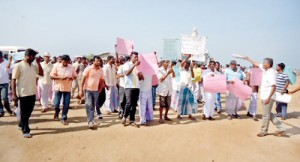
Sunday, 22nd February 2015
By S. Rubatheesan
Navy now looks on while Indians raid our fish bank, say locals
Suppaiyah Yogarasan, 58, from Myliddy Jaffna is looking for work as a labourer in order to support his eight-member family because, he says, he can no longer make a living from fishing in the northern sea.

Mannar fishermen stage a protest. Pic by Lambart Rosarian
“There is no livelihood other than the sea for us. I don’t know any other profession with which to support my family other than this. My two sons are not going to sea these days: they have switched to a tailoring business,” he said.
Mr. Yogarasan, is one of the thousands of fishermen in the north whose business dropped drastically in recent weeks with the invasion of Indian fishermen into Lankan waters for illegal poaching.
“They don’t just destroy our sea resources with their heavy, double-folded nets but also damage our nets and equipment that we bought after obtaining loans from the banks,” he said.
In the never-ending dispute between the fishermen of two countries across the Palk Strait the fishermen of Sri Lanka’s north and east allege that their new government, which took office last month, has taken a soft line with Indian fishermen poaching in local waters.
The Indian poachers who were once arrested and prosecuted in Sri Lankan courts now enter Lankan waters without any trouble from the navy or other authorities, the fisheries trade unions and federations of the north and east allege.
On Monday, as the Indian Premier, Narendra Modi, met President Maithripala Sirisena in New Delhi on a state visit to India, the fisherfolk of Mannar took to the streets to protest against the Indian fishermen’s continual poaching in Lankan waters.
Justin Zoysa, President of the Mannar Fisheries Federation and a chief architect of the protest, said the Indians go on fishing while Sri Lankan fishermen are forced to look on from the shores of Mannar, bereft of aid from their authorities.
“Earlier, under the previous government, the navy took action against those who crossed into Lankan waters. They were arrested and prosecuted and their trawlers were seized.
“Now, the new government has adopted a new policy of not arresting anyone and our fishermen cannot go fishing because the Indians sweep all of the fish into their nets all at once,” he said.
Health Minister Dr. Rajitha Senaratne, who previously held the fisheries portfolio and was a member of the recent government delegation to New Delhi, said illegal fishing was one of the main issues taken up during the talks between President Sirisena and Mr. Modi.
According a research study done by Professor Soosai Siluvaithasan of the University of Jaffna, Sri Lanka is losing Rs. 60 billion in fisheries revenue annually due to the illegal poaching by Indian fishermen in Lankan waters because of the large number of Indian boats using illegal methods of fishing.
He said a proposal submitted from the Indian side which enabled the two countries’ fishermen to engage in fishing in each other’s waters was turned down on the basis that Sri Lanka’s northern fishermen would be adversely affected.
Minister Senaratne said Lanka’s southern fishermen go to Indian seas looking only for tuna but the Indians come to the northern seas for squid, prawns, and lobsters.
Mr. Zoysa, who took part in previous fisheries talks in Chennai and New Delhi, said Sri Lankan fishermen had made it clear to the Indian fishermen and their authorities that they would not allow anyone to fish in their waters.
From India, the President of the Rameswaram Port Mechanised Boats Fishermen Association, N.J. Bose, acknowledged to the SundayTimes that some Indian fishermen go fishing in Lankan waters but the association had begun a campaign among the Indian fishing community urging fishermen not to go into Sri Lankan seas for fishing.
“We have warned our fishermen not go to the Lankan sea for fishing using illegal fishing methods. If they do, we are going cancel their fishing permits immediately,” he said, adding that his association did not desire to have the issue become a problem in bilateral talks.
Anthonypillai Emiliyanumpillai of the northern Fisheries Federation, said the Indian fishermen raid the “fish bank” in the north sea.
“If they fish for two days in our sea we can’t find anything for the next couple of days because they wipe out all the fish,” he said. “I think they are using some kind of digital techniques to determine the exact location of the bank.”
Mr. Emiliyanumpillai said the federation had complained to many authorities including the navy regarding illegal poaching but no action was being taken to safeguards their rights.
“We ask only one thing: we are living on asmall island with limited sea resources; please don’t come to our sea and destroy our riches because our whole generation depends on this,” he said.
From : http://www.sundaytimes.lk/150222/news/fishing-in-troubled-waters-137158.html

